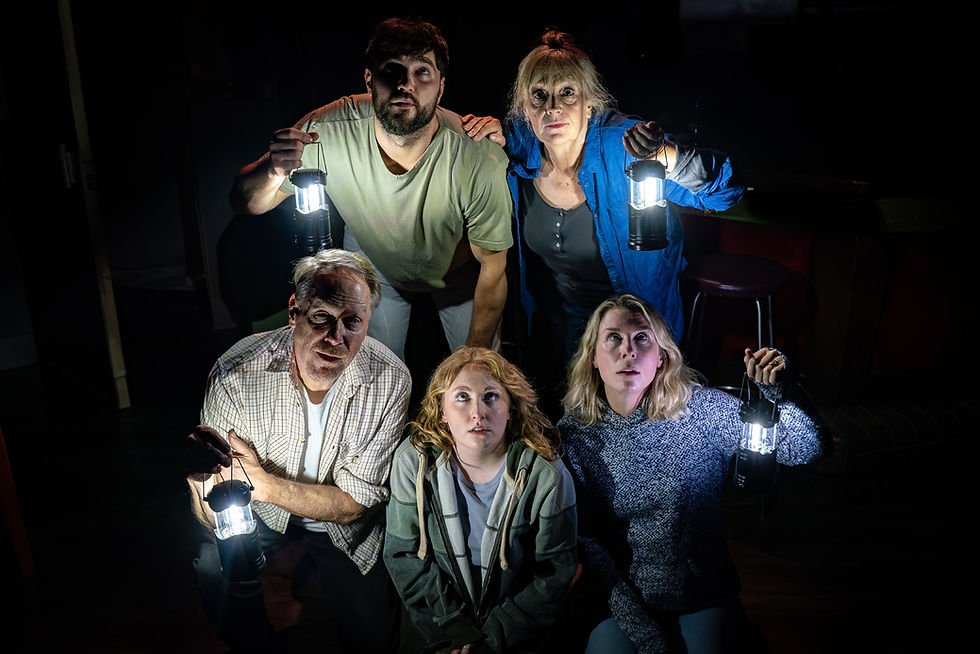Review: Possum Trot (Theatre At The Tabard)
- All That Dazzles

- Nov 16, 2025
- 3 min read
Review by Justin Williams
⭐️⭐️⭐️⭐️
Some shows flaw you with a defining line, and Possum Trot does exactly that. “Tradition is pressure from dead people” arrives almost casually on the wind, but hangs in the air like the cosy smell of coffee drifting from the diner’s machine. It’s humorous, blunt, and just a little bit painful; by the end of the night, it becomes the phrase that deftly unlocks every character we’ve spent time with. It’s absolutely relatable to us.

The one-act play, by award-winning playwright Kathy Rucker (Crystal Springs, Sultan’s Battery, Darling), pulls us into a small Nebraskan town wrestling with climate change, corporate farming, and young people leaving for better options. Yet Rucker isn’t giving a TED Talk; she writes people. The script delivers wry humour, stubbornness, hope, and the complex love-hate of tradition.
The production excels under the direction of Scott Le Crass. His ability to put characters in a sort of emotional pressure cooker and let us watch them simmer is brilliant. The piece often feels like a collection of beautifully observed vignettes — a diner serving hatch into lives frozen between who they were raised to be and who they might become. Le Crass is especially adept at conveying the passage of time; scenes flow organically from one to the next, or days slip by, even though we never leave the diner. The pacing is gentle yet purposeful.

As for design, Reuben Speed gives us a diner that has absolutely seen better days, with battered surfaces, faded colours, and a sense of “patched, not replaced,” which right from the outset tells us everything about the town before the actors even speak. The set feels loved but worn, much like Maxine, the diner’s owner. I particularly enjoyed some of the detail: the beaded curtain that gently sways in the preset, creating its own moment of life, and the frosted glass that keeps the world forever just out of reach behind a screen. It encourages us to focus on these people, trapped together in their ingrained traditions. My only design issue? The single entrance. That diner door is a busy little route, and at times, actors seemed to struggle with the door mechanism.
The lighting design by Joseph Bryant is rather beautiful. Moments through the frosted glass become a storytelling tool, painting entire days passing outside while the characters sit in their routines inside. There’s a cute basement moment created almost entirely through light and sound. Complete with Hannah Bracegirdle’s sound design, the atmosphere feels cosy, lived-in, and sometimes a little raw.

Sarah Berger lead the show as Maxine, who is excellent. With an impressive career to her name, you can view her skill in every moment she’s onstage, which is a lot. Maxine’s the pin holding the whole family together; caring, tired, capable, and sometimes trapped by the role she’s taken on for years. Berger also has a rich directing background, including a bilingual Macbeth in Kyrgyzstan, and that sense of dramaturgical experience breathes through how she shapes Maxine’s passage. Watching her realise a life outside the diner is deeply rewarding for the audience.
As Prue, Maxine’s daughter, Dani Arlington plays the “slightly out-of-place wife” with a sound performance. There’s a real sense of someone who loves her family but never feels fully woven into its traditions. She brings gentle humour, frustration, and softness. Francis brings a bright, youthful sincerity to the part, and there are moments where Billie feels incredibly real. The only dip is the mother–daughter dynamic, which doesn’t fully land. In their most honest moment together, hearing Billie call Maxine “mum” didn’t quite carry the emotional weight it needed. It doesn’t harm the show, but it’s something that may deepen as the run continues, I think.

Todd Boyce is a standout as Duane. His natural warmth and comic timing keep giving the play little infusions of light when things turn heavy. At first, he seems like a gentle device, but as the story unfolds, he becomes the unexpected emotional support beam of the whole piece. Duane ends up being the “vehicle” several characters need, literally and metaphorically, whether that is helping Billie face difficult news or encouraging Maxine to finally imagine seeing the sea. Nikolas Salmon tackles one of the harder roles of the night as Jeremiah. There are genuinely powerful moments in his performance, particularly when showing the strain of responsibility. At times, though, his choices felt a little large for the intimacy of the Tabard.
By the end, Possum Trot leaves you thinking hard about the weight of tradition and the courage it takes to break or lovingly reshape the expectations we inherit. It’s a fun, detailed, and heartfelt night of theatre with efficient design choices and strong performances across the board, which sparkles with what Le Crass does best.
Possum Trot plays at Theatre At The Tabard until 29th November. Tickets from https://tabard.org.uk/whats-on/possum-trot/
Photos by Bonnie Britain


